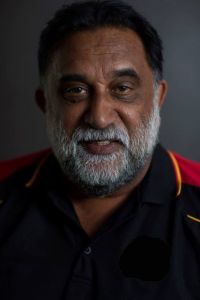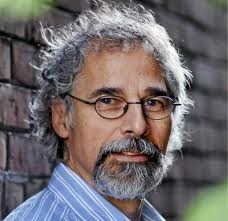Visitors
2023

Les Malezer
Les Malezer is descended on his father’s side from the Gubbi Gubbi / Butchulla peoples of the Mary River and Fraser Island region of southeast Queensland and, on his mother’s side, from the Gamiliroi peoples of northwest NSW.
As school captain, he matriculated from Inala State High School in Brisbane in 1969. He was a skilled sportsman in cricket, rugby league, tennis and basketball. He began studies in Engineering at the University of Queensland but discontinued after being faced with racism at both study and work.
Les Malezer’s working career commenced in 1972 with the Commonwealth Department of Labour and National Service in Brisbane, pursuing training and work opportunities for Aboriginal and Torres Strait Islander youth. He was then transferred to Canberra after the Whitlam government was elected into the newly-appointed Department of Aboriginal Affairs soon.
In the public service he quickly advances to senior positions in the Commonwealth public service before joining to the Queensland government to become head of Aboriginal and Torres Strait Islander Affairs under the Goss administration in 1990.
Apart from his career in government Les Malezer also worked extensively in community-controlled organisations at the local, regional, national and international levels, and he held important posts in representative bodies of Aboriginal and Torres Strait Islander peoples.
From his early years in Brisbane he participated in community organisations, meetings and rallies, as a member of the health services, legal services, housing organisations and welfare groups.
He became the Chairperson of the Foundation for Aboriginal and Islander Research Action (FAIRA) in 1974 and has continued to hold that position on many occasions when not in conflict with his employment. He continues as the Chairperson of FAIRA in the present times.
Les Malezer became Secretary General of the National Aboriginal Conference in 1984, joined the Royal Commission into Aboriginal Deaths in Custody in 1989, and was appointed as Executive Assistant to the Chairman of the Aboriginal and Torres Strait Islander Commission (ATSIC) in 2002.
In 2010, he was elected Co-Chair of the National Congress of Australia’s First Peoples. He served two terms as Co-Chairperson in this role.
He has expert knowledge regarding Indigenous Peoples of the world and the relevant human rights standards adopted at the international level and in Australia. Les Malezer is well known internationally for his work on human rights, and raising the profile of Indigenous Peoples in the United Nations and the Commonwealth Heads of Government meetings.
He has travelled extensively, meeting with Indigenous Peoples living in countries such as New Zealand, USA, Canada, Panama, Guatemala, Guyana, Ecuador, Peru, Colombia, South Africa, India, Thailand, The Philippines, Taiwan, New Guinea, Fiji, Norway, Sweden, Finland and Russia.
A notable achievement in his life was when he addressed the UN General Assembly in 2007 following the successful vote for the UN Declaration on the rights of Indigenous Peoples.
Then, in 2008, he was awarded the Australian Human Rights medal from the Australian Human Rights Commission. The award came after two decades of advocacy for the human rights of Indigenous Peoples at the international level, working in conjunction with Indigenous Peoples delegations from around the world.
He was appointed as a member of the United Nations Permanent Forum on Indigenous Issues for the term of 2017 to 2019.
He has devoted his entire career fighting for rights of the Aboriginal and Torres Strait Islander people. Les Malezer continues to seek change for legal recognition of First Peoples’ status and rights in Australia.
2020 Visitors

Professor Thalia Anthony
Professor Thalia Anthony researches Indigenous people and the law, with specialisation in Indigenous justice mechanisms and systemic racism in criminal law and procedure. Her research is grounded in legal history and understandings of the colonial legacy in legal institutions. Professor Anthony has developed new approaches to researching and understanding the role of the criminal law in governing Indigenous communities. Her research is developed in conjunction with Indigenous organisations in Australia and overseas. She has written influential books Indigenous People, Crime and Punishment (Routledge 2013) and a Decolonising Criminology (Palgrave 2019). She currently leads an Australian Research Council project that introduces Aboriginal justice reports in sentencing in Australia.
Engagement

Jonathan Rudin
Jonathan Rudin received his LLB and LLM from Osgoode Hall Law School. In 1990 he was hired to establish Aboriginal Legal Services of Toronto and has been with ALST ever since. Currently he is the Program Director. Mr. Rudin has appeared before all levels of court, including the Supreme Court of Canada including representing ALST before the Supreme Court in R v. Ipeelee. Mr. Rudin has written and spoken widely on issues of Aboriginal justice. He co-wrote the Royal Commission on Aboriginal Peoples’ report on Justice – Bridging the Cultural Divide- and was a member of the Research Advisory Committee of the Ipperwash Inquiry. Mr. Rudin also teaches on a part-time basis in the Law and Society Program at York University. Last but not least, he plays the mandolin and sings with Gordon’s Acoustic Living Room, a group that plays regularly in Toronto and has a number of videos on YouTube.
2019 Visitor

Dr Baz Dreisinger
Dr. Dreisinger works at the intersection of race, crime, culture and justice. She earned her Ph.D. in English from Columbia University, specializing in American and African-American studies. At John Jay she is the Founding Academic Director of John Jay's Prison-to-College Pipeline program, which offers college courses and reentry planning to incarcerated men at Otisville Correctional Facility, and broadly works to increase access to higher education for incarcerated and formerly incarcerated individuals. Dr. Dreisinger's book Incarceration Nations: A Journey to Justice in Prisons Around the World (2016) was heralded by the New York Times, NPR and many more, and was named a notable book of 2016 by the Washington Post. Professor Dreisinger moonlights as a journalist and critic, writing about Caribbean culture, race-related issues, travel, music and pop culture for such outlets as the New York Times, Los Angeles Times and Wall Street Journal, and producing on-air segments about music and global culture for National Public Radio (NPR). Her first book Near Black: White-to-Black Passing in American Culture (2008) was featured in the New York Times and on NPR and CNN. Together with Oscar-nominated filmmaker Peter Spirer, Professor Dreisinger produced and wrote the two nationally aired documentaries about hip-hop, criminal justice and the prison industrial complex. She regularly speaks about justice reform and prison issues on popular news media and in international settings.
Dr. Dreisinger was named a 2017-2018 Global Fulbright Scholar and is working to internationally replicate the Prison-to-College Pipeline, with a focus on the Caribbean and South Africa. She is currently working on a road map for how prison-to-college pipelines and restorative justice can replace mass incarceration as a system of justice.
Engagement